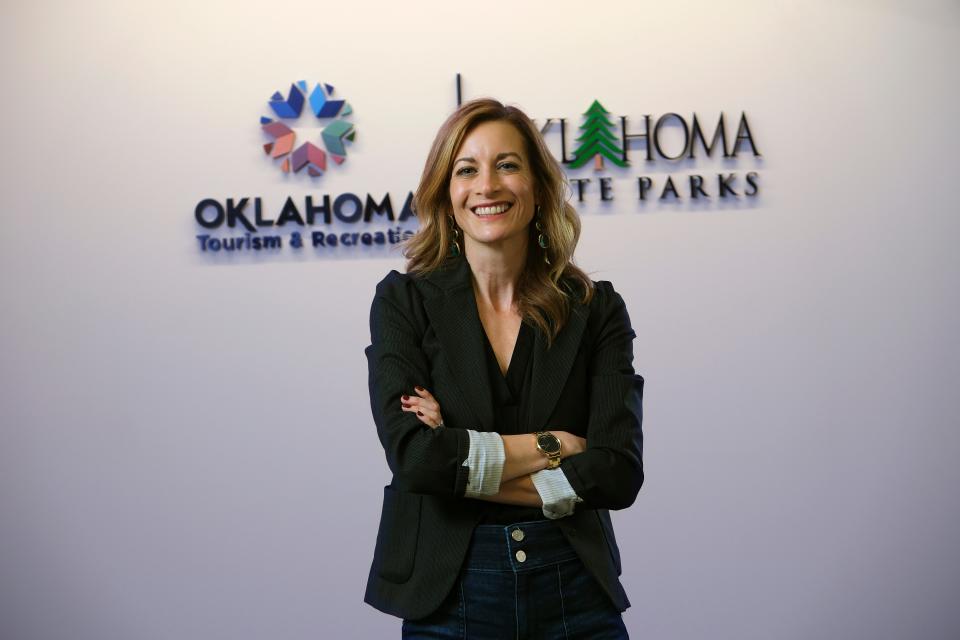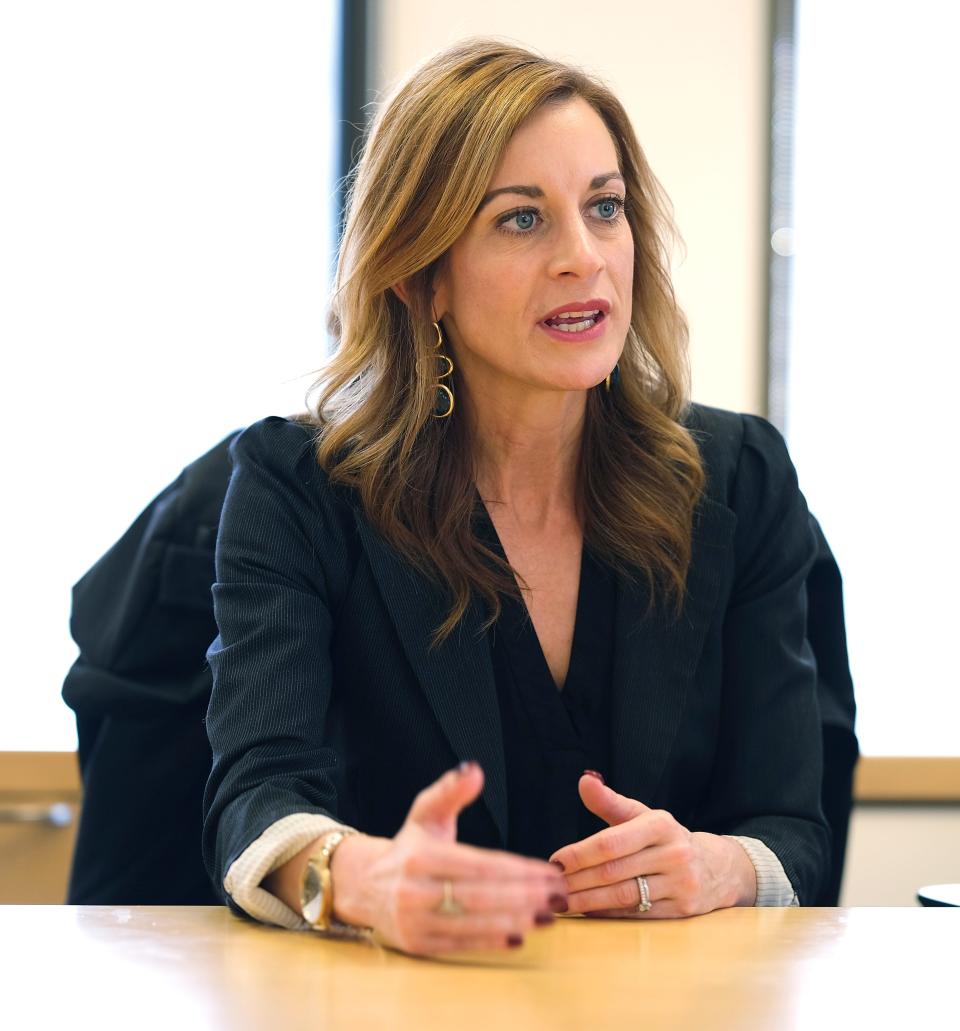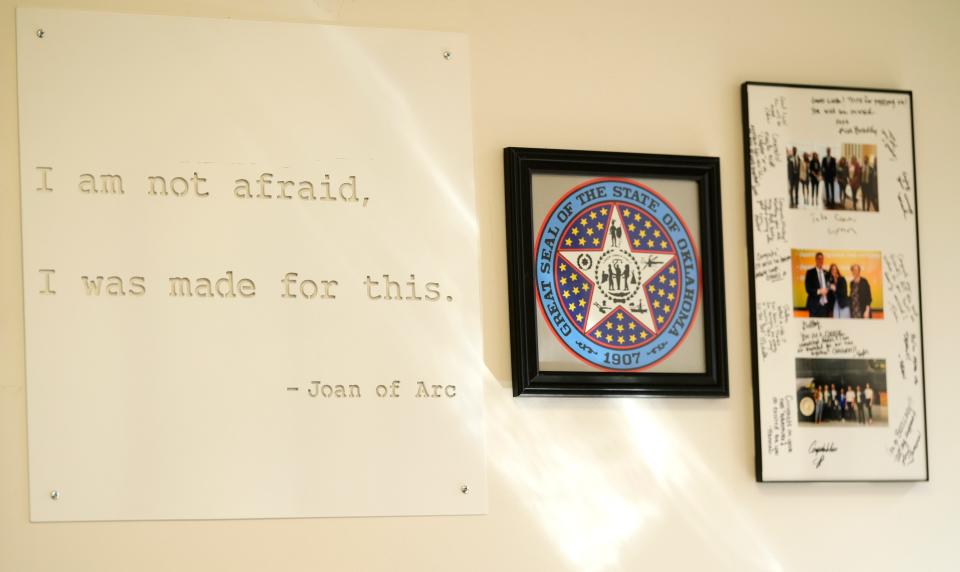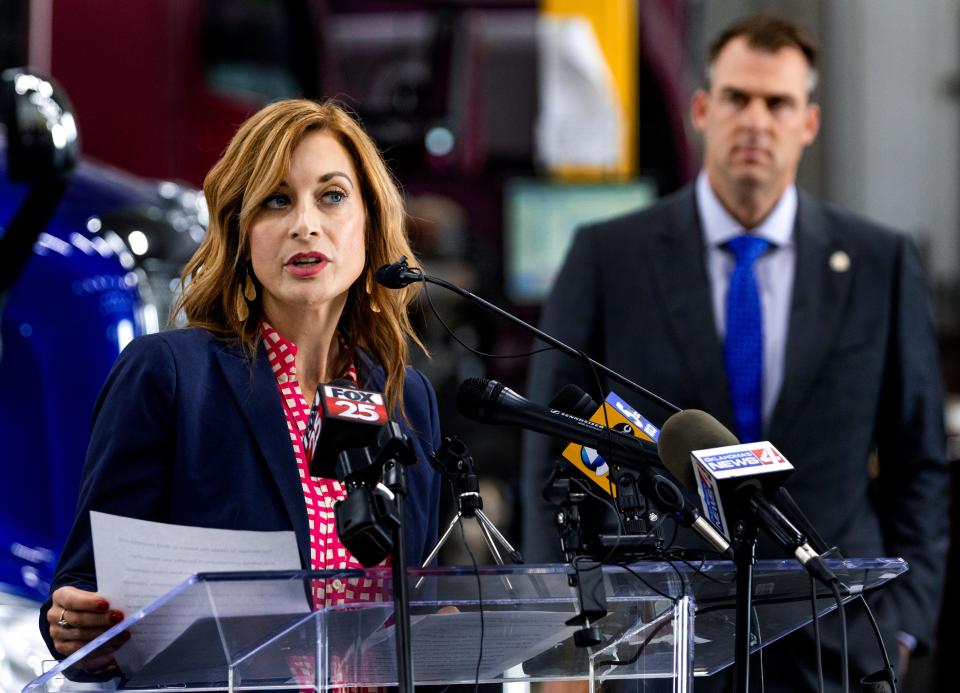Shelley Zumwalt has helped improve Oklahoma government. Can she make people forget Swadley's?

Serving doughnuts wasn’t in Shelley Zumwalt’s job description when she was tapped to lead Oklahoma’s state employment agency in the early days of the pandemic.
She handed out doughnuts in the pre-dawn darkness outside her office because she wanted desperate Oklahomans in lines stretching hundreds of yards to see someone responsible for fixing the mess.
“Even though I knew there was hostility there, I knew that me showing up — in some way they felt like I was accountable for their presence in that situation,” Zumwalt said in a recent interview.
Today, with her troubleshooting skills employed as executive director of the Oklahoma Tourism and Recreation Department, Zumwalt is thinking about serving food again, this time in the restaurants set to open in state parks, where a scandal over a barbecue chain left visitors without a dining option.
She plans to be at the openings for all six, which, on the current timetable, will be before Memorial Day.
MORE: Oklahoma Gov. Kevin Stitt appoints Shelley Zumwalt as new Tourism and Recreation director
“I’ll be there for every single one,” she said. “I’ll even wait tables. I’ll shake every single hand that comes in there.”
Zumwalt, a 1997 graduate of Norman High School who wanted to save the world through journalism, has gone from low-level budget analyst to running two agencies she knew little about; in 11 years, she has had 10 jobs in state government.
John Budd, the former Sonic Corp. executive who served as chief operating officer for the state of Oklahoma in the first years of Gov. Kevin Stitt's administration, said, “Shelley brings immense passion and fire to anything she does. I think she sets a really high standard for herself (and) a high bar for her service and what government could be.”

Former state Sen. James Leewright, who worked with Zumwalt to resolve the crisis in providing pandemic unemployment benefits, called her “the gold standard for someone you want to officially run, or move forward or even transform a state agency.”
Leewright praised her “openness and communication with me in the legislative branch” and said he couldn’t think “of a better person to come in and tackle what’s going on over there” at the Tourism Department.
Since taking over in October at the department, Zumwalt has immersed herself in budget, personnel and park maintenance issues. But she knows she’s going to be judged on the success of the restaurants.
“I knew that was going to be the thing I was going to hear about the most,” Zumwalt said, adding that she thought about the bidding process “every single day, every single night for three months.”
She also thought about what success would look like in the wake of the controversy over Swadley’s exclusive contract to renovate and operate state park restaurants. The whole matter is now under investigation by the state attorney general and the Oklahoma State Bureau of Investigation. Meanwhile, the restaurants have been closed for nearly a year.
“Success isn’t just getting a vendor into the restaurants,” Zumwalt said. “Success is having a fully transparent process where the public knows that this is happening in front of them and they can trust that this process has been executed in a way that has resulted in the best vendor getting into that situation.”

Zumwalt, who traveled the state to hold open houses for potential vendors at the restaurants and members of the nearby communities, said, “There’s feelings wrapped up in this, too, and we can’t put those aside. Communities felt like they got something and it got taken away.
“And so, yeah, of course I’m going to be judged by it.”
A 'culture of silence and secrecy,' new Oklahoma tourism director says of troubled agency
'I don't know what I would have done'
There was no clutter on Zumwalt’s desk during a recent interview in her downtown Oklahoma City office, little of anything but her water bottle and a copy of Oklahoma Today, the magazine published by the Tourism Department since 1956.
Amid family pictures and official memorabilia on the wall was a large plaque bearing a quote attributed to Joan of Arc: “I am not afraid. I was made for this.”
Zumwalt’s battles have been a bit more prosaic, though still wrenching. She was consumed for months with the stories she heard from unemployed people in dire straits waiting for their benefits. She read emails from people losing their homes and being unable to feed their families.
“I was a single mom for eight years,” she said. “I don’t know what it was like at that moment. I don't want to say that I do. But I could see — had I been in that situation — I don’t know what I would have done.”
Anyone tempted to think of her as the proverbial faceless bureaucrat should know that her face was everywhere during the early days of the pandemic, first as a spokesperson for the Health Department and then during the struggles at the employment agency. She did television interviews by Zoom from her home during the lockdown and then outside and inside employment offices in Oklahoma City and Tulsa. At Tourism, she has been highly visible in discussing the agency's challenges.
She’s not shy. She began hosting a news program on public access television in ninth grade in Norman.
Zumwalt, 44, is the child of two artists: Her mother taught piano and her father was a photographer and graphic design artist. They met while teaching at Rose State College in Midwest City.
Zumwalt played high school and college soccer. She pursued her interest in broadcast journalism at St. Gregory’s University and then at the University of Central Oklahoma, but became disillusioned with the entertainment aspect of it.
Her state government career began as a low-level budget analyst at the Oklahoma Department of Human Services and continued as a communications specialist at obscure and highly technical agencies. That work was the foundation for her later roles.
“I understand the budgeting process, I understand the mechanics of it,” she said.
Because of that and her background in communications, agency leaders began putting her in trouble spots.
“Every single time that there was something that bubbled up, either because I had institutional knowledge or the ability to navigate those waters, I think that I was one of those people” deployed, Zumwalt said.
“I think they trusted that I could quickly offer solutions that would turn down the heat strategically.”
Swadley's Bar-B-Q and the Oklahoma Tourism Department: What we know about the deal
The early part of the pandemic was confusing
Budd, then the state’s chief operating officer, turned to Zumwalt and Donelle Harder to take over the media operations at the Health Department in the early days of the pandemic. Harder had run the press shop for former U.S. Sen. Jim Inhofe and had been a top adviser to Gov. Kevin Stitt.
“The early part of the pandemic was confusing to the entire country and certainly to Oklahoma,” Budd recalled recently. “Data was sparse. We were like most of the country ― a little back on our heels in terms of things like PPE (personal protective equipment) and certainly things like testing. Testing didn’t exist.
“One of the things we recognized early on was that communications were critically important in this space. The public needed to know what was going on so they could make informed decisions. So we basically took some of the best (communications) people we had in state government — Shelley was one of those people — and put them over in the Health Department to help because it was just so much to sort through and try to communicate effectively to the public.”

Interesting mix of experience
Within weeks, Zumwalt was shifting gears again, as the Oklahoma Employment Security Commission board looked for a new executive director. Budd and other Stitt administration officials recommended Zumwalt to the board, and she was named interim director in May 2020.
Leewright was chairman of the Senate Business, Commerce and Tourism Committee then and getting about 400 emails a day from his own constituents who were having trouble getting unemployment benefits. And, because his committee oversaw the agency, he became the point person in the Senate for the problems.
Leewright began working with Zumwalt, sometimes spending an hour or more on Zoom calls.
“I was amazed how she could tackle such monumental issues by just using her tremendous foresight, common sense and communications skills,” Leewright said. “And really how she could wrap her mind around extremely complex problems and issues and then come through with a very methodical, straightforward solution. And not everybody can do that.”
Zumwalt said, “It’s not that I was superhuman or anything, but I had just this interesting mix of experience. Because I had been in state government, I knew the right people to call and I knew the processes.”
The month Zumwalt took over, 229,039 Oklahomans were on the unemployment rolls. That was compared to 53,727 just two months before.
“I think I figured out the things I needed to figure out fast first,” she said. “I grounded myself every single morning with the same set of facts: How much did we pay out last night? How are we running compared to last week?”
The biggest problem at the agency was getting the 40-year-old computer system to accommodate the new unemployment benefits programs created by Congress to address multiple types of workers.
Agency IT experts would make modifications to the software and then “you have to test it to make sure you don’t break something,” Zumwalt said.
“We wouldn’t know sometimes that we had broken something until we had gotten to the finish line. That was why it was so insanely frustrating.”
Zumwalt opened the physical offices as soon as the state lockdown ended.
“We had shut down all of our offices,” she said. “The phone lines were just jammed up every single day. The systems were not working. The pressure valve had to be released in multiple ways there. It was not just one problem. It was attacking 10 problems all at once.”
Zumwalt set up claims events in the Oklahoma City area, Tulsa and Ardmore and pitched in to fill out forms. The events served over 10,000 people in less than a month.
They would finish an 18-hour day in Oklahoma City that started at 4 a.m. and pack up all of their computers and open up before dawn in Tulsa.
“We processed more claims from March 2020 through March of ‘21 than the agency had processed in the prior decade preceding,” Zumwalt said. “It was on a scale that you couldn’t even fathom it.”
More: Tourism promises transparency in state park restaurant bid process in wake of Swadley's
No one is going to save us
Zumwalt is well aware that veteran employees at the agencies where she has taken the reins aren’t going to immediately love the changes she makes.
“You have to at first not care if people like you or not,” she said. “I’ve walked up on employees of mine saying stuff where you’re just like: ‘Wow.’
“Maybe you’ve met them once or twice, but they’ve made this judgment about you and what you care about and what you're trying to do based on maybe very little interaction and something that you changed.
“It’s not personal. Because, again, people don’t like change, and you’re doing that exact thing that they hate. And it’s always easier to look back fondly than to look forward with fear.”
When she first met with senior staff members at the employment agency, she told them, “No one is going to save us. There’s not someone out there that’s coming in … We’re going to save ourselves. And we can — and you are the people who can do it.”
At the Tourism Department, Zumwalt tells staff members, “‘You guys are going to be so proud when we look back and see where we’ve come a year from now.’ And I believe that totally.”
Zumwalt related that outlook to state senators last month as she delivered some eye-opening testimony about why staff members maybe aren’t so proud right now.
“The amount of work that needs to be done at the agency is staggering,” she told the Senate subcommittee that oversees the department’s funding.
Seven proposals were submitted to run the state park restaurants. Here's what we know.
Among the problems she listed: The department’s funding was segregated to the point that a financial officer at the top couldn’t even see it all; there was one attorney at a department of 700 people and only two human resources officers, both of whom had less than six months experience; half of the 200 people hired at the department in the previous year had left; and a culture of “silence and secrecy” prevailed.
On top of that, maintenance at parks had been ignored for so many budget cycles that some park leaders stopped asking for money, even for critical projects. At one state park, chronic problems with the sewer system could lead to a shutdown of the park if conditions deteriorate.
The agency’s budget this year is about $22 million, Zumwalt said.
“I asked for $2.5 million more and $15 million for deferred maintenance.”
Before, during and after her detailed description to senators about the department, Zumwalt told them the problems were fixable — with their help.
A way to continue to serve
Zumwalt had promised to stay at the Employment Security Commission for at least two years, and she stayed two and a half. She has promised to give two years to Tourism.
She has turned down some lucrative offers from the private sector, tempting ones since college tuition for her daughter looms, but not ones promising the same kind of fulfillment she has had.
“I run to the fires out of instinct but also out of obligation,” she said.
Tourism, she said, was a way to continue to serve.
More: After Swadley's debacle, Oklahoma Tourism is seeking new state park restaurant operators
The best text she has received in many weeks, she said, was the one informing her that there were seven bidders interested in opening restaurants at the state parks. The last time the department sought bidders for the restaurants, there was one. It didn't end well.
Zumwalt opened the books for the potential vendors, saying she would give them whatever information they needed to make a bid. She deliberately kept herself off the committee that will select the winners.
Recalling her time at the Employment Security Commission, Zumwalt said she “went through the hardest two years that agency is hopefully ever going to go through.”
At the Tourism Department, she said, she is not meeting people “on their very worst day.” Instead, she said, she is meeting them at state parks or other recreation areas that they had been looking forward to visiting.
‘It’s a completely different way to interact with the public."
This article originally appeared on Oklahoman: Shelley Zumwalt's next big task: making people forget Swadley's

 money
money 